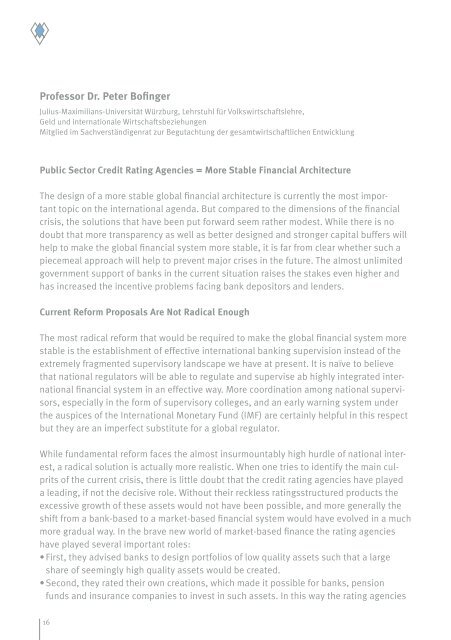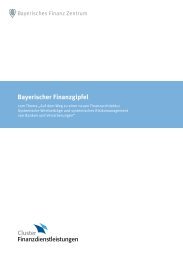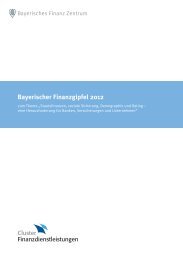Bayerischer Finanzgipfel
Bayerischer Finanzgipfel
Bayerischer Finanzgipfel
Erfolgreiche ePaper selbst erstellen
Machen Sie aus Ihren PDF Publikationen ein blätterbares Flipbook mit unserer einzigartigen Google optimierten e-Paper Software.
16<br />
Bayerisches Finanz Zentrum<br />
Bayerisches Finanz Zentrum<br />
Bayerisches Finanz Zentrum<br />
Professor Dr. Peter Bofinger<br />
Julius-Maximilians-Universität Würzburg, Lehrstuhl für Volkswirtschaftslehre,<br />
Geld und internationale Wirtschaftsbeziehungen<br />
Mitglied im Sachverständigenrat zur Begutachtung der gesamtwirtschaftlichen Entwicklung<br />
Public Sector Credit Rating Agencies = More Stable Financial Architecture<br />
The design of a more stable global financial architecture is currently the most important<br />
topic on the international agenda. But compared to the dimensions of the financial<br />
crisis, the solutions that have been put forward seem rather modest. While there is no<br />
doubt that more transparency as well as better designed and stronger capital buffers will<br />
help to make the global financial system more stable, it is far from clear whether such a<br />
piecemeal approach will help to prevent major crises in the future. The almost unlimited<br />
government support of banks in the current situation raises the stakes even higher and<br />
has increased the incentive problems facing bank depositors and lenders.<br />
Current Reform Proposals Are Not Radical Enough<br />
The most radical reform that would be required to make the global financial system more<br />
stable is the establishment of effective international banking supervision instead of the<br />
extremely fragmented supervisory landscape we have at present. It is naïve to believe<br />
that national regulators will be able to regulate and supervise ab highly integrated international<br />
financial system in an effective way. More coordination among national supervisors,<br />
especially in the form of supervisory colleges, and an early warning system under<br />
the auspices of the International Monetary Fund (IMF) are certainly helpful in this respect<br />
but they are an imperfect substitute for a global regulator.<br />
While fundamental reform faces the almost insurmountably high hurdle of national interest,<br />
a radical solution is actually more realistic. When one tries to identify the main culprits<br />
of the current crisis, there is little doubt that the credit rating agencies have played<br />
a leading, if not the decisive role. Without their reckless ratingsstructured products the<br />
excessive growth of these assets would not have been possible, and more generally the<br />
shift from a bank-based to a market-based financial system would have evolved in a much<br />
more gradual way. In the brave new world of market-based finance the rating agencies<br />
have played several important roles:<br />
• First, they advised banks to design portfolios of low quality assets such that a large<br />
share of seemingly high quality assets would be created.<br />
• Second, they rated their own creations, which made it possible for banks, pension<br />
funds and insurance companies to invest in such assets. In this way the rating agencies







